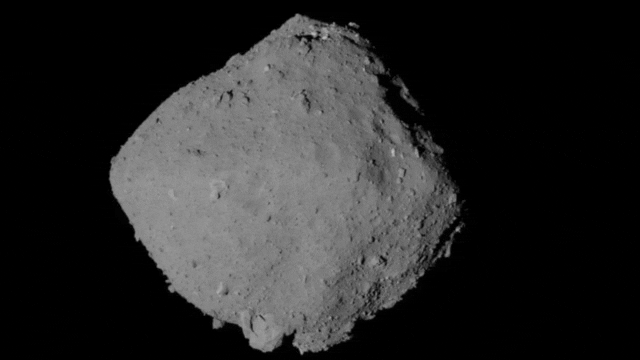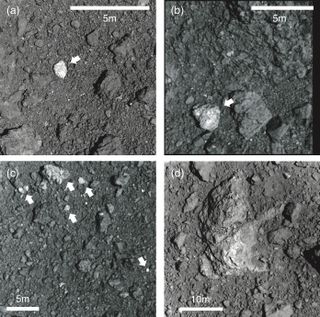Scientists have discovered {{that a}} sample of the asteroid Ryugu was overrun with Earth-based life sorts after being delivered to our planet. The evaluation reveals how worthwhile terrestrial micro-organisms are at colonization, even on extraterrestrial provides.
The samples had been collected by the Japan Aerospace Exploration Firm (JAXA)’s spacecraft Hayabusa2, which launched in December 2014 and rendezvoused with Ryugu in June 2018. Haybusa2 then spent a 12 months discovering out the asteroid, which has a diameter of spherical 3,000 toes (900 meters), sooner than diving to its flooring and scooping out a sample.
This Ryugu sample was returned to Earth on Dec. 6, 2020, nevertheless Haybusa2 continued on to assessment additional asteroids. The sample was minimize up and despatched to quite a few teams of scientists, along with the employees that made this new discovery.
“We found micro-organisms in a sample returned from an asteroid. They
appeared on the rock and unfold with time sooner than lastly dying off,” employees chief Matthew Genge of Imperial School London knowledgeable Home.com. “The change throughout the number of micro-organisms confirmed these had been residing microbes. Nonetheless, it moreover steered they solely currently colonized the specimen merely sooner than our analyses and had been terrestrial in origin.”
The invention took the kind of rods and filaments of pure matter, which the employees interpreted as filamentous microorganisms. Exactly what sort of microorganisms these had been shouldn’t be acknowledged by the employees, nevertheless Genge has a great suggestion of what they could be.
“With out discovering out their DNA, it is inconceivable to ascertain their exact type,” the researcher said. “Nonetheless, they’d been likely micro organism resembling Bacillus since these are fairly widespread filamentous micro-organisms, notably in soil and
rocks.”

In spite of everything, with humanity at current engaged throughout the search for microbial life previous the bounds of our planet, notably on Mars, the question is, could these micro-organisms have been present on Ryugu when the sample was gathered and thus could they symbolize alien life?
Disappointingly, the employees has effectively and conclusively dominated this out.
“Sooner than we prepared the sample, we carried out nano-X-ray computed tomography, and no microbes had been seen,” Genge said. “In any case, the change in inhabitants suggests they solely appeared after the rock was uncovered to the ambiance, better than a 12 months after it was returned to Earth.”
The researchers found that inside per week of exposing the specimen to the Earth’s ambiance, 11 microbes had been present on its flooring. Solely every week later, the inhabitants of terrestrial colonizers had grown to 147.
“It was very beautiful to look out terrestrial microbes contained in the rock,” Genge said. “We usually polish meteorite specimens, and microbes not typically appear on them. Nonetheless, it solely desires one microbial spore to set off colonization.”

Whereas these outcomes don’t truly inform us one thing about extraterrestrial life, they do converse to the hardiness of life sorts proper right here on Earth, notably micro-organisms. The findings even have implications for the results that spacecraft and rovers could have on the planets they go to.
“It reveals that microorganisms can readily metabolize and survive upon
extraterrestrial provides. On Earth, there’s ample home-grown
pure supplies accessible, nevertheless on planets resembling Mars, extra-martian
pure provides would possibly assist an ecosystem,” Genge said. “Our findings advocate that home missions could very nicely be contaminating home environments. It moreover reveals that terrestrial microorganisms are adept at quick colonization.”
Fortuitously, as Genge recognized, home companies make use of planetary security efforts designed to attenuate the possibility of contamination.
Genge moreover warns that scientists should be cautious of contamination when future samples are returned to Earth sooner than assuming the detection of extraterrestrial life.
“The reality that terrestrial microbes are the Earth’s most interesting colonizers means we are going to on no account totally low value terrestrial contamination,” the researcher continued. “Most of the time, contamination simply is not a difficulty as long as you perceive its provide. The difficulty comes when scientists attempt to say that the ‘pristine’ nature of a specimen is proof that choices are extraterrestrial.”
As for the Imperial School of London researcher and his employees, they’re wanting forward to inspecting additional asteroid samples, hopefully free from company from Earth!
“The employees is fixed to assessment samples from Ryugu and Bennu. Hopefully, subsequent time with out terrestrial micro organism colonizing these provides!” Genge concluded.
The employees’s evaluation was printed throughout the journal Meteoritics & Planetary Science.














Leave a Reply